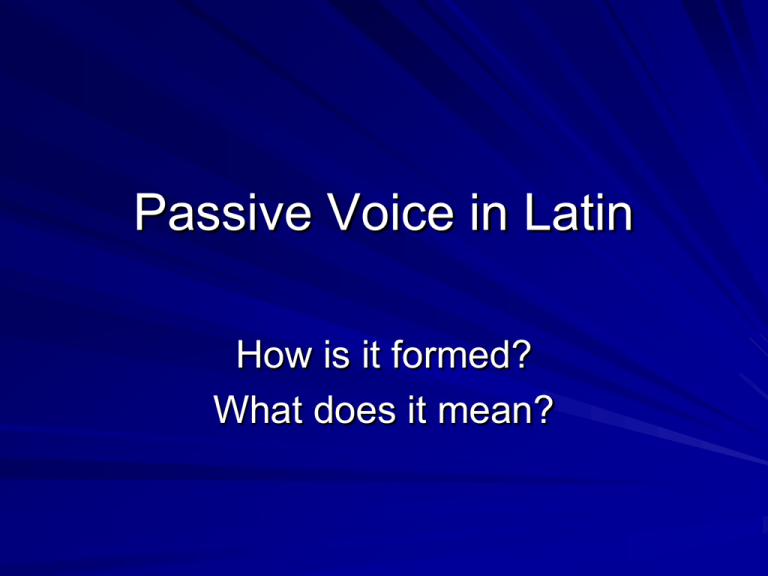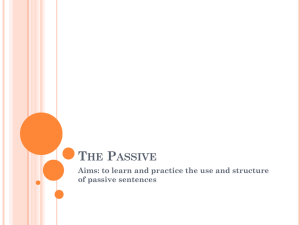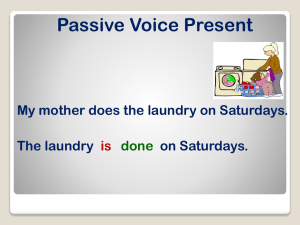Passive Voice in Latin
advertisement

Passive Voice in Latin How is it formed? What does it mean? What does Passive Voice mean? There are two “voices” in Latin (and English): active and passive Active Voice the SUBJECT performs the action Vir cibum portat (the subject, man, is doing the carrying) Passive Voice the subject is being acted or performed upon Cibus ā virō portātur (the subject, food, is being carried) In passive voice, the DOER/PERFORMER of the action is called the ablative of personal agent, and it follows the preposition ā or ab. Cibus ā servō portātur. (The doer of the action, the slave, is the personal “agent”, so we use ā before it) NONpersonal doers of action go into the ablative of means WITHOUT a preposition Servus carrō portātur. (The “doer” of the action is the cart) How is Passive Voice Formed? In present, imperfect, and future tenses, passive verbs use a different set of endings. The verb stem + standard vowel + personal passive endings: -r -mur -ris -mini -tur -ntur Present tense, passive -r -ris -tur -mur -mini -ntur So, portō (“carry”, first conjugation) is conjugated and translated as follows” portor (I am carried) portāris (you are carried) portātur (he/she/it is carried) portāmur (we are carried) portāmini (you all are carried) portantur (they are carried) Present tense, passive -r -mur -ris -mini -tur -ntur ….and teneō (“hold”, second conjugation) is conjugated and translated as follows: teneor (I am held) tenēris (you are held) tenētur (he/she/it is held) tenēmur (we are held) tenēmini (you all are held) tenentur (they are held) Imperfect tense, passive In the imperfect tense, the same endings are used: portābar (I was being carried) …..etc. portābāmur (we were being carried) and……… tenēbar (I was being held) …..etc. tenēbāmur (we were being held) Future tense, passive The future tense, passive of first and second conjugation verbs is formed in a similar way: Portābor (I will be carried) portābimur (we will be carried) Portāberis Portābitur Tenēbor (I will be held) …..etc. tenēbimur (we will be held) Tenēberis Tenēbitur ……….but, remember: …..etc. Future tense, passive, cont. ……just as in active voice, the third and fourth conjugations, future passive, is a little DIFFERENT (no –bor, -beris, etc.): mittar (I will be sent) mittēris (you will be sent) mittētur (he/she/it will be sent) …and audiar(I will be heard) ….etc. mittēmur (we will be sent) mittēmini (you all will be sent) mittentur (they will be sent) audiēmur (we will be heard) Active to Passive When changing an “active” sentence into “passive” voice, remember this: The direct object of the active sentence becomes the subject of the passive sentence. The subject of the active sentence becomes the agent (either personal or non-personal) of the passive sentence. Active to Passive Example: (Active) Servus portat cibum. (Passive) Cibus portātur ā servō. The original direct object (cibum) becomes the subject (Cibus) of the passive sentence. The original subject (Servus) becomes the [personal] agent (ā servō) of the passive sentence. End Lesson 27 Perfect, Pluperfect and Future Perfect Tenses -- Passive Good News: the perfect, pluperfect and future perfect tenses are VERY easy to form. First of all, you use the proper** form of the perfect passive participle (4th principal part.) **proper form means masculine, feminine or neuter, singular or plural, depending on the gender and number of the subject………. ………..in other words, if the subject is masculine/singular, you use (eg) portātus (4th principal part of PORTŌ, masculine singular form) if the subject is feminine/plural, you use (eg) portātae (feminine plural form) ……and so on. Perfect Passive Forms For the perfect passive forms of the verb, you use the proper form of the perfect passive participle + sum, es, est, sumus, estis, sunt portātus (or portāta if I’m female) sum (I have been carried) portātus (or portāta if you’re female) es (You have been carried) portātus est (He has been carried) portāta est (She has been carried) portātum est (It has been carried Perfect passive, plural forms …….and the plural is formed in a similar way: portāti (or portātae if we’re all females) sumus (We have been carried) portāti (or portātae if you’re all females) estis (You all have been carried) portāti sunt (They have been carried –masculine or mixed company) portātae sunt (They have been carried – feminine) portāta sunt (They have been carried – neuter) Pluperfect Passive Forms For the pluperfect passive forms of the verb, you use the proper form of the perfect passive participle + eram, eras, erat, eramus, eratis, erant portātus (or portāta if I’m female) eram (I had been carried) portātus (or portāta if you’re female) eras (You had been carried) portātus erat (He had been carried) portāta erat (She had been carried) portātum erat (It had been carried Pluperfect passive, plural forms …….and the plural is formed in a similar way: portāti (or portātae if we’re all females) eramus (We had been carried) portāti (or portātae if you’re all females) eratis (You all had been carried) portāti erant (They had been carried –masculine or mixed company) portātae erant (They had been carried – feminine) portāta erant (They had been carried – neuter) Future perfect Passive Forms For the future perfect passive forms of the verb, you use the proper form of the perfect passive participle + ero, eris, erit, erimus, eritis, erunt portātus (or portāta if I’m female) ero (I will have been carried) portātus (or portāta if you’re female) eris (You will have been carried) portātus erit (He will have been carried) portāta erit (She will have been carried) portātum erit (It will have been carried Future perfect passive, plural forms …….and the plural is formed in a similar way: portāti (or portātae if we’re all females) erimus (We will have been carried) portāti (or portātae if you’re all females) eritis (You all will have been carried) portāti erunt (They will have been carried –masculine or mixed company) portātae erunt (They will have been carried – feminine) portāta erunt (They will have been carried – neuter) Some Examples Cista movēta est. Epistulae mīsae erant. Servus portātus erit. Plaustra audīta sunt.








